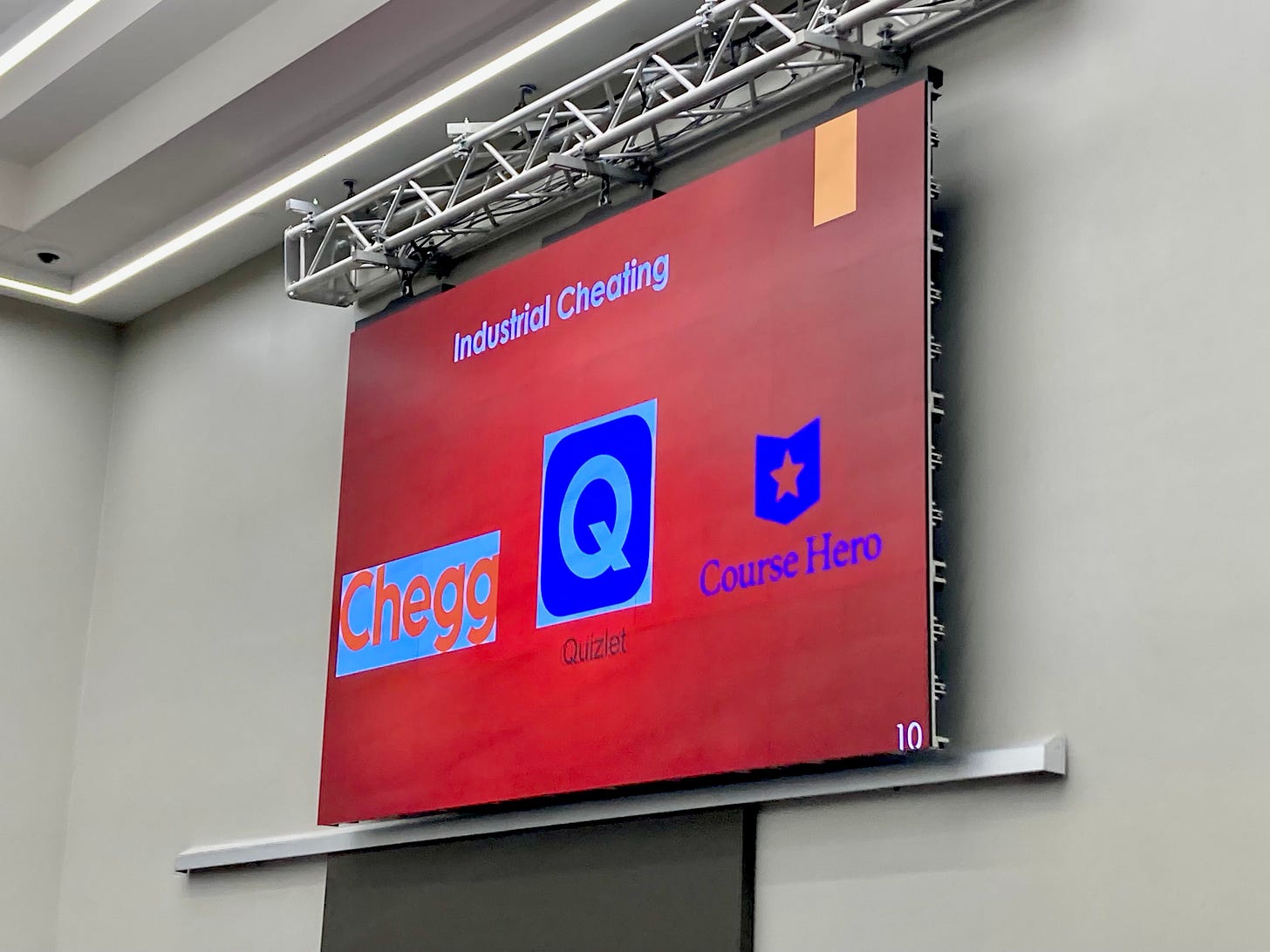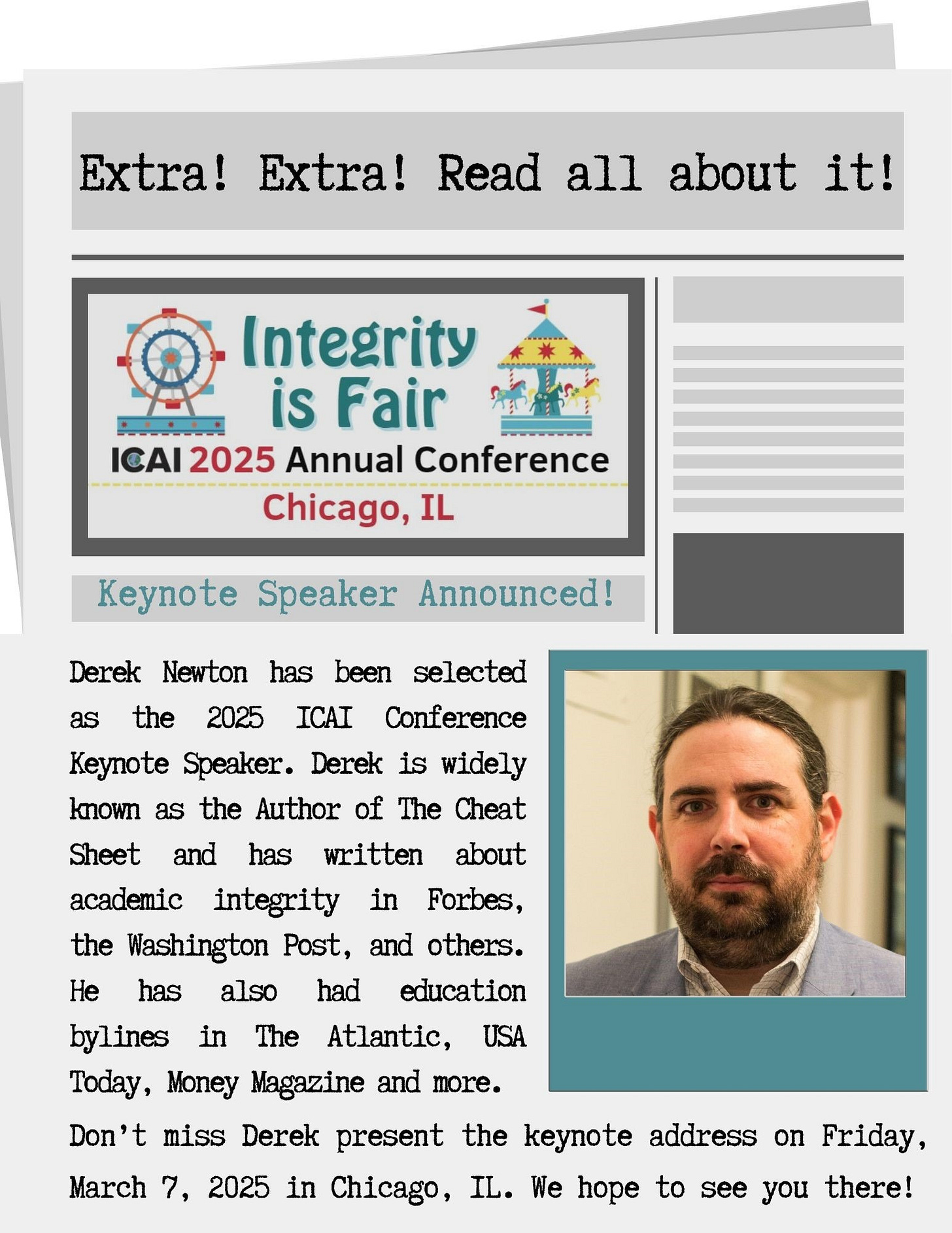Issue 310
Subscribe below to join 4,129 other smart people who get “The Cheat Sheet.” New Issues every Tuesday and Thursday.
If you enjoy “The Cheat Sheet,” please consider joining the 18 amazing people who are chipping in a few bucks via Patreon. Or joining the 39 outstanding citizens who are now paid subscribers. Paid subscriptions start at $8 a month. Thank you!
Vox Writes About ChatGPT and Text Detection, Fails
Vox recently subjected its readers to a story about OpenAI and text detection. They should not have.
It’s not that the story is awful. There’s already plenty of that. It’s just that it’s not news — we covered the ChatGPT watermark story a month ago, in Issue 308 — and is very significantly wrong.
OK, it’s awful.
To catch you up, when OpenAI launched ChatGPT it promised to watermark its text so it could be easily detected. They did not. It turns out that OpenAI/ChatGPT made a watermark system for text created by their bot about two years ago, and the company has refused to release it. You’re caught up.
First, Vox completely blows its own credibility on the topic with this paragraph:
Right now, cheating on essays via the use of AI tools is hard to catch. A number of tools advertise they can verify that text is AI-generated, but they’re not very reliable. Since falsely accusing students of plagiarism is a big deal, these tools would have to be extremely accurate to work at all — and they simply aren’t.
That’s simply not true.
Vox did not interview anyone who could credibly speak to the issue of AI text detection. At least they did not quote anyone on the topic. As in, anyone at all. They just kind of decided to ignore all the research and declare that AI detectors are not accurate. It’s so lazy and counterproductive.
Vox is correct, however, in getting at why OpenAI won’t release its watermarking technology:
If OpenAI — and only OpenAI — released a watermarking system for ChatGPT, making it easy to tell when generative AI had produced a text, this wouldn’t affect student essay plagiarism in the slightest. Word would get out fast, and everyone would just switch over to one of the many AI options available today: Meta’s Llama, Anthropic’s Claude, Google’s Gemini. Plagiarism would continue unabated, and OpenAI would lose a lot of its user base. So it’s not shocking that they would keep their watermarking system under wraps.
First, a big shout out to Vox for listing the other places students can go to their AI plagiarism. Nice. Psst, word is the Sinaloa cartel is cooperating with U.S. Drug Enforcement Agency so here are a few other places you can go to get your cocaine. Come on.
But the point is correct, and it deserves underlining. OpenAI/ChatGPT won’t release its watermark solution because it’s bad for business — which ought to make clear exactly what business OpenAI is in. In case I’m being too subtle, OpenAI is in the cheating business. Or, as Vox put it, if OpenAI text was discoverable, the company “would lose a lot of its user base.” And they’d rather keep their market share than act with integrity.
Which is what we said a month ago.
Anyway, I continue here with this from Vox:
I think teachers are very much capable of finding better ways to assess students
On behalf of educators everywhere, thank you for the vote of confidence, Kelsey Piper, senior writer.
Then there’s also:
In the school plagiarism debate, the stakes are low.
Again, thanks Kelsey. Going to go ahead and disagree with you on that. I think academic fraud, the entire value proposition of organized education, and actually learning to write are pretty important.
As a reminder, the piece quotes not a single educator, authority on AI text generation or detection, or academic misconduct. It’s just Kelsey. Jazz hands, everyone.
As journalism, it’s impossible to defend.
Two Headlines from India
I’ve said before that if I wrote about academic cheating in India as much as it deserves, I’d write about nothing but cheating in India.
The country, to put it mildly, has a problem. On chronic malfeasance, India is second only to China — maybe second. My bet is that academic fraud happens in China more often. We only know about India’s appalling lack of academic integrity because of its mostly free press. But I am guessing. And my point is that India has major problem which disintegrates the value in any academic credential issued there.
For consideration, here are two headlines regarding cheating in India in the last few days.
From the Wall St Journal (subscription required):
Gangs Are Making Millions Helping Indians Cheat on Exams
Middle-class families pay thousands of dollars to help their children get an unlawful edge in crucial tests
And from Business Insider:
India's exam system is in chaos, with some families paying thousands to help their kids cheat
To start, no kidding. Also, this is not the first time we’ve shared news about criminal gangs running cheating rings in India (see Issue 137).
You have to wonder, or maybe I just wonder, how long India can keep running such a questionable education system and feeding college-bound students into U.S., U.K., Australian, and European schools. I ask because cheating is a learned behavior. It’s habitual. If students cheated in high school, they are very likely to cheat in college. As the saying goes, no one cheats in college for the first time.
Unfortunately, I think we all know the answer. Foreign schools will keep accepting students from India and other fraud-plagued places so long as the students — read: their parents — write full tuition checks. Which also means that the schools cashing those checks have sizeable incentives to not look for, or address, cheating in their own halls.
The system, I am deeply afraid, is corrupted on both ends. But I am off topic. India specifically has a serious problem.
Class Notes
Notes, plural.
OKC
I was in Oklahoma last week to speak with the Oklahoma Association of Testing Personnel. Some photos, with thanks, from OATP:
It was a great conference and the hosts were outstanding.
AUS
That same evening I was honored to join a virtual panel in Australia with integrity researchers and practitioners. I was surprised and heartened that about 600 people participated. As I told the audience, Australia leads the world in acknowledging, discussing, and addressing academic cheating.
I’ll have some brief thoughts on the Australia panel to share soon.
ICAI
I am also very happy to share that I will keynote the 2025 conference of ICAI, the International Center for Academic Integrity. That will be in March, in Chicago. Here is their announcement:
BTS Ask
Every year around this time, around back to school, I make a public pitch to support The Cheat Sheet by either becoming a paid subscriber or chipping in a few dollars via Patreon. The Patreon link is way up top and I think this link will allow you to become a paid subscriber:
I’m not sure if it’s the right or best model, but there is no difference at all between being a paid subscriber and a free subscriber. Everything is the same. The Cheat Sheet was created to connect and share. Walling off parts of it seems antithetical.
So, all you get by supporting my work is the overwhelming pride. And a thank you. You can, I am pretty sure, post a note with your paid subscription, and I do publish those. A paid subscription is $8 a month.
If you can, please do. For those who do already, thank you. And whether you do or not, thank you for all you do to support and share The Cheat Sheet.





